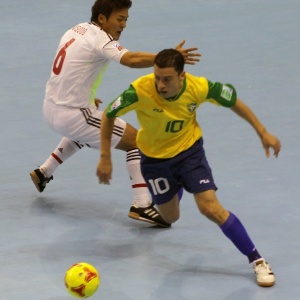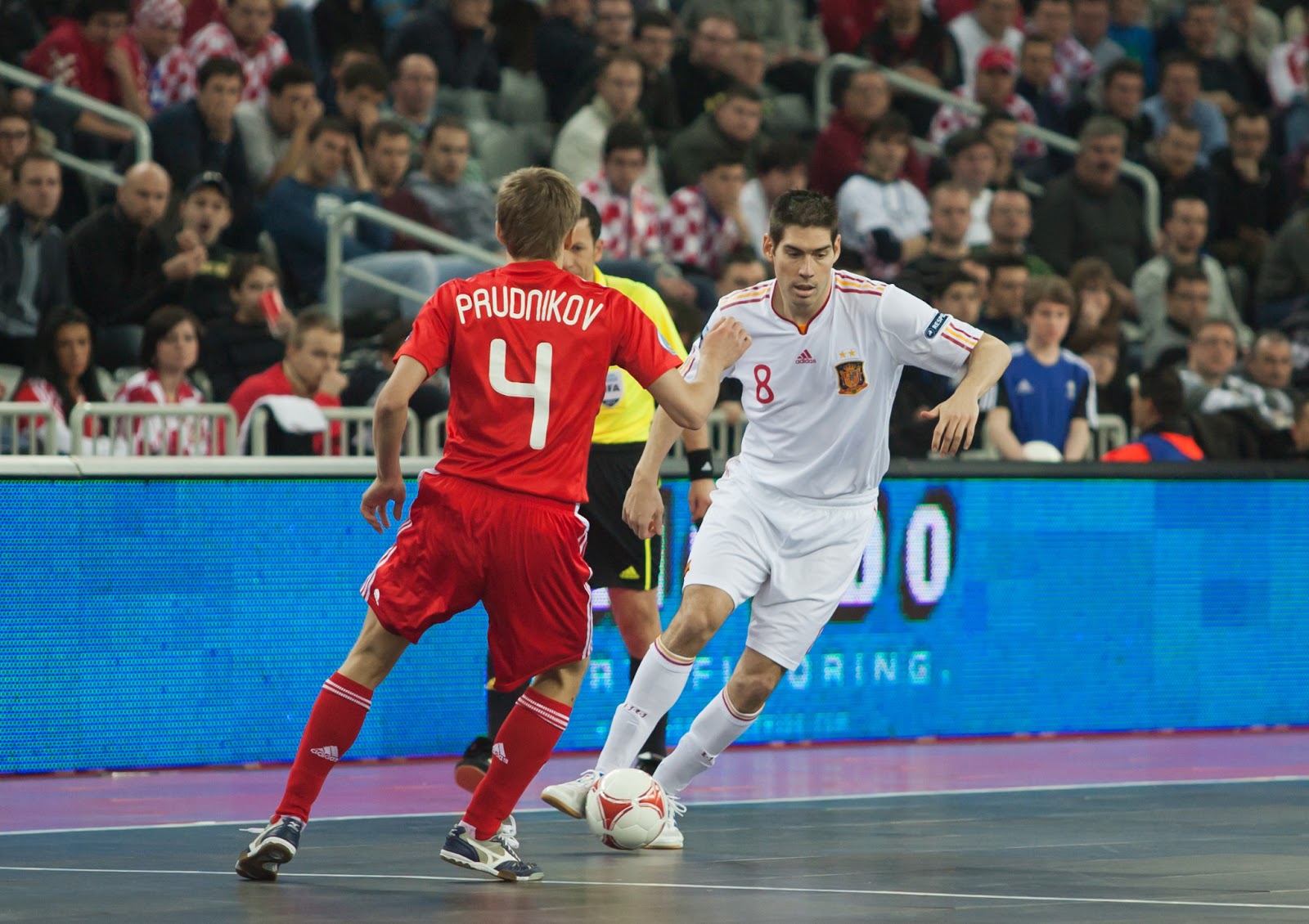Excellent decision making is the most important attribute a player can have in my opinion. The best players in the world are the most intelligent players.
In Part 1 of this post I will discuss the skill of decision making and in Part 2 I will describe the best method of training to develop this quality.
Decision Making
The objective for a player in any match situation is to choose the optimal solution. The characteristics of the game of futsal complicates this task as there is a limited amount of time and space available.
Split second and correct decision making is key to taking advantage of the small, short-lived opportunities. This is the most important attribute in the game, ahead of any technical skill.
When I think of clever players, names such as Kike (Spain) , Alemao (Spain), Fernandinho (Brazil) and Prudnikov (Russia) come to mind. They appear to be always one step ahead of the game. Their clever actions might be an unbelievable pass to create a goal or a less spectacular ability to close a passing line when defending in inferiority.
To understand what makes a good decision maker let’s first look at the process for making decisions. I have split this into four stages;
- Observation of the current match situation (positions of team-mates, opponents and ball; score; knowledge of your qualities and those of team-mates and opponents; stage of the match; previous events in the match and many more things)
- Accessing tactical knowledge and past experience to select the optimal solution relevant to the current game situation
- Execution of the selected solution (technical action)
- Observing the outcome (successful pass, recuperated the ball etc.) and obtaining feedback on the chosen solution
An important quality for the first stage is awareness. To be able to choose the correct solution it is crucial to have the appropriate information about the situation you are in. This includes awareness of what is likely to occur in the future, otherwise known as anticipation or reading of the game.
Without good awareness you might be a fast and effective decision maker but you will still likely make a poor selection because it was based on insufficient information.
Included under past experience, in the second stage, is a consideration of the outcomes and patterns from your previous decisions. The more times the player goes through this process (i.e. making a decision), the more knowledgeable they will be about what the likely outcomes for any given action in each situation. This increased understanding can be used to improve future decision making.
Each time this whole process is completed, the more evidence is available to verify what solution will be successful. This is the principle used in scientific research to mitigate random variation. If you test the effectiveness of a medicine on 10,000 people you can be much more confident about your findings than if you tested it on just 5 people.
I’d argue that intelligent players like those mentioned are not born great decision makes. They go through this decision making process thousands and thousands of times and each time use the feedback to improve their future decision making by an imperceptable amount. For the majority of time this is done without conscious awareness.
They master the principles, patterns, techniques, tactics, variations and ideas of the game. Through practise they internalise these concepts to where it might be appear as having a natural feel for the game.
What differentiates these players is how their use their experience. There are many players that have played many games and gone through decision making process many times and in many situations. Often these players are complemented as being experienced. Yet this attribute, experience, is only an advantage if that feedback is used to improve future decision making. Otherwise that experience counts for nothing.
There are players who have been playing for many years yet they are still making the same mistakes they made when they first started. There is a quote that describes this that has been attributed to Juan Lillo, the mentor of Pep Guardiola;
“You don’t have 20 years of experience, you have repeated the same year 20 times”
Learning
I once came across an article about skill acquisition in sprinting. It stated that there are four stages of learning. Through my personal experience I agree very much with this process of improving at any skill. These were
- Unconscious incompetence – When you don’t know about something you can’t yet do.
- Conscious incompetence – You know what to do but haven’t yet mastered it.
- Conscious competence – You can do it but only with conscious thought, it is not automatic.
- Unconscious competence – Performed perfectly without any conscious effort or thought.
The top players are, of course, at stage 4 in this model. The ability to make correct and precise decisions without conscious effort is a necessity at the highest level where the tempo of the game does not afford the time to deliberate the options.
Creativity
 Creativity looks like some spontaneous action that has come from nowhere. I would argue that this is not the case and it is underpinned by this knowledge of the game and possible solutions.
Creativity looks like some spontaneous action that has come from nowhere. I would argue that this is not the case and it is underpinned by this knowledge of the game and possible solutions.
It is built on a foundation of deep understanding and technical mastery. This is what former chess player Josh Waitzkin describes as ‘numbers, to leave numbers‘.
Once the players have mastered the game, the player simply carries out what to them seems the best and most logical option. To the spectator, who is much less knowledgeable and incapable of executing the same action, it appears as if it was a huge leap into the unknown.
You may observe one of these futsal artists do something that seems contrary to the prescription of a fundamental tactical concept or instruction. However they have such a deep understanding of the underlying principle and ability to read the game situation they figure out the optimal solution which may sometimes appear unorthodox.
My former coach, Mico Martic, always says “There are no formulas”. What he means is there is never a definitive answer in futsal. The player on court must read the game situation and act accordingly.
This is the real essence, beauty and art of futsal.
See Part 2 to discover the method of training that improves decision making.

really good read! keep up the good work.
Quality Mr Reed.
"Unconscious competence" – I have the idea how to get this level for tricks.
1) Create short list of "today tricks" on mind or on paper (not more 7)
2) In game (I mean nonprofessional's game) try to use all many times.
3) After N games change list or add some new to it.